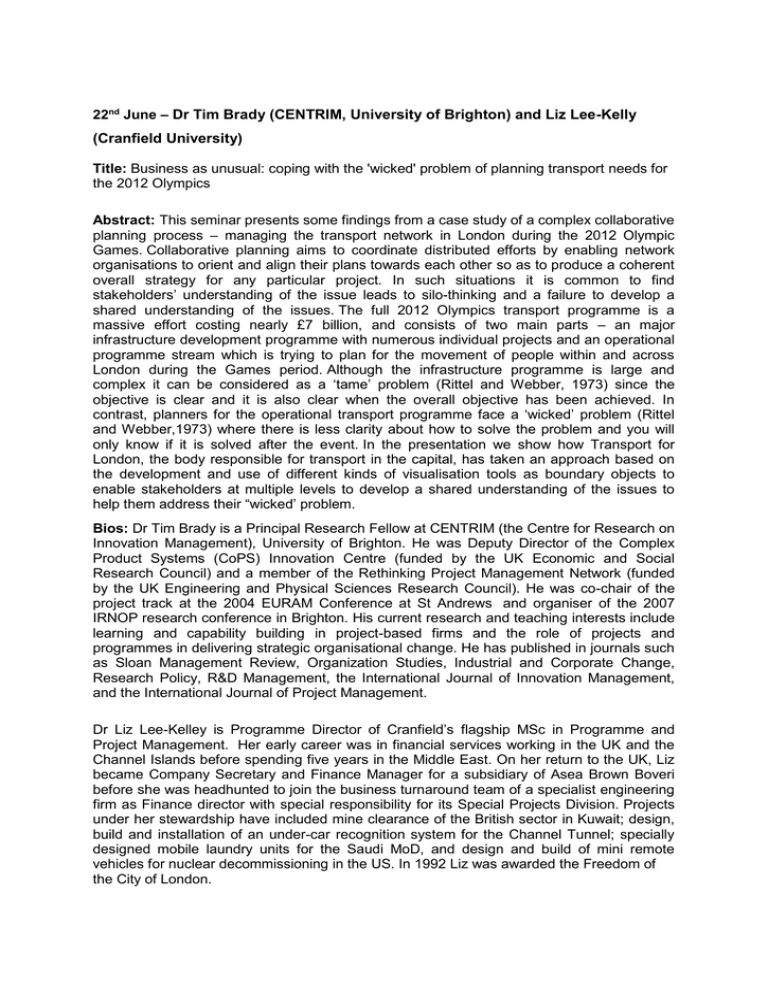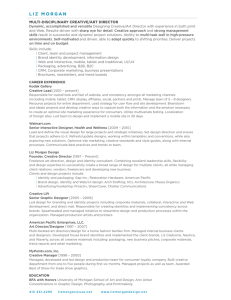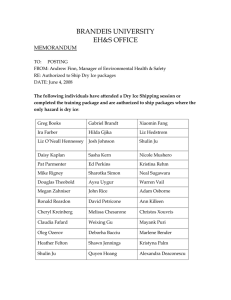tim brady and liz lee-kelly ab and bio
advertisement

22nd June – Dr Tim Brady (CENTRIM, University of Brighton) and Liz Lee-Kelly (Cranfield University) Title: Business as unusual: coping with the 'wicked' problem of planning transport needs for the 2012 Olympics Abstract: This seminar presents some findings from a case study of a complex collaborative planning process – managing the transport network in London during the 2012 Olympic Games. Collaborative planning aims to coordinate distributed efforts by enabling network organisations to orient and align their plans towards each other so as to produce a coherent overall strategy for any particular project. In such situations it is common to find stakeholders’ understanding of the issue leads to silo-thinking and a failure to develop a shared understanding of the issues. The full 2012 Olympics transport programme is a massive effort costing nearly £7 billion, and consists of two main parts – an major infrastructure development programme with numerous individual projects and an operational programme stream which is trying to plan for the movement of people within and across London during the Games period. Although the infrastructure programme is large and complex it can be considered as a ‘tame’ problem (Rittel and Webber, 1973) since the objective is clear and it is also clear when the overall objective has been achieved. In contrast, planners for the operational transport programme face a ‘wicked’ problem (Rittel and Webber,1973) where there is less clarity about how to solve the problem and you will only know if it is solved after the event. In the presentation we show how Transport for London, the body responsible for transport in the capital, has taken an approach based on the development and use of different kinds of visualisation tools as boundary objects to enable stakeholders at multiple levels to develop a shared understanding of the issues to help them address their “wicked’ problem. Bios: Dr Tim Brady is a Principal Research Fellow at CENTRIM (the Centre for Research on Innovation Management), University of Brighton. He was Deputy Director of the Complex Product Systems (CoPS) Innovation Centre (funded by the UK Economic and Social Research Council) and a member of the Rethinking Project Management Network (funded by the UK Engineering and Physical Sciences Research Council). He was co-chair of the project track at the 2004 EURAM Conference at St Andrews and organiser of the 2007 IRNOP research conference in Brighton. His current research and teaching interests include learning and capability building in project-based firms and the role of projects and programmes in delivering strategic organisational change. He has published in journals such as Sloan Management Review, Organization Studies, Industrial and Corporate Change, Research Policy, R&D Management, the International Journal of Innovation Management, and the International Journal of Project Management. Dr Liz Lee-Kelley is Programme Director of Cranfield’s flagship MSc in Programme and Project Management. Her early career was in financial services working in the UK and the Channel Islands before spending five years in the Middle East. On her return to the UK, Liz became Company Secretary and Finance Manager for a subsidiary of Asea Brown Boveri before she was headhunted to join the business turnaround team of a specialist engineering firm as Finance director with special responsibility for its Special Projects Division. Projects under her stewardship have included mine clearance of the British sector in Kuwait; design, build and installation of an under-car recognition system for the Channel Tunnel; specially designed mobile laundry units for the Saudi MoD, and design and build of mini remote vehicles for nuclear decommissioning in the US. In 1992 Liz was awarded the Freedom of the City of London. Since leaving industry, Liz has built her reputation as as a skilled international lecturer who can teach across boundaries and bring people successfully together in a learning environment through analysing the human dimension in Project and Programme Management. She is a member of Cranfield’s International Centre for Programme Management and also serves as an editorial board member for various journals in her areas of interest. Liz's research publications are centred on three themes: (1) Team Relational Dynamics, Innovation and Learning, (2) E-Business Applications and (3) E-Government. Her current research interest is focused on understanding the human dimension in projects and information management systems, in particular, and on trust and intra-group identification in temporary and distributed teams.


